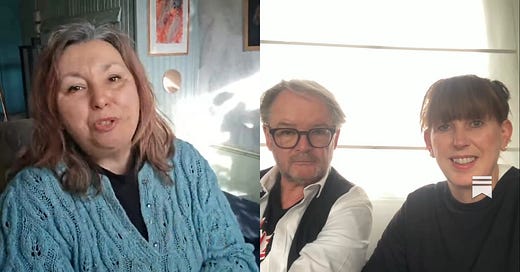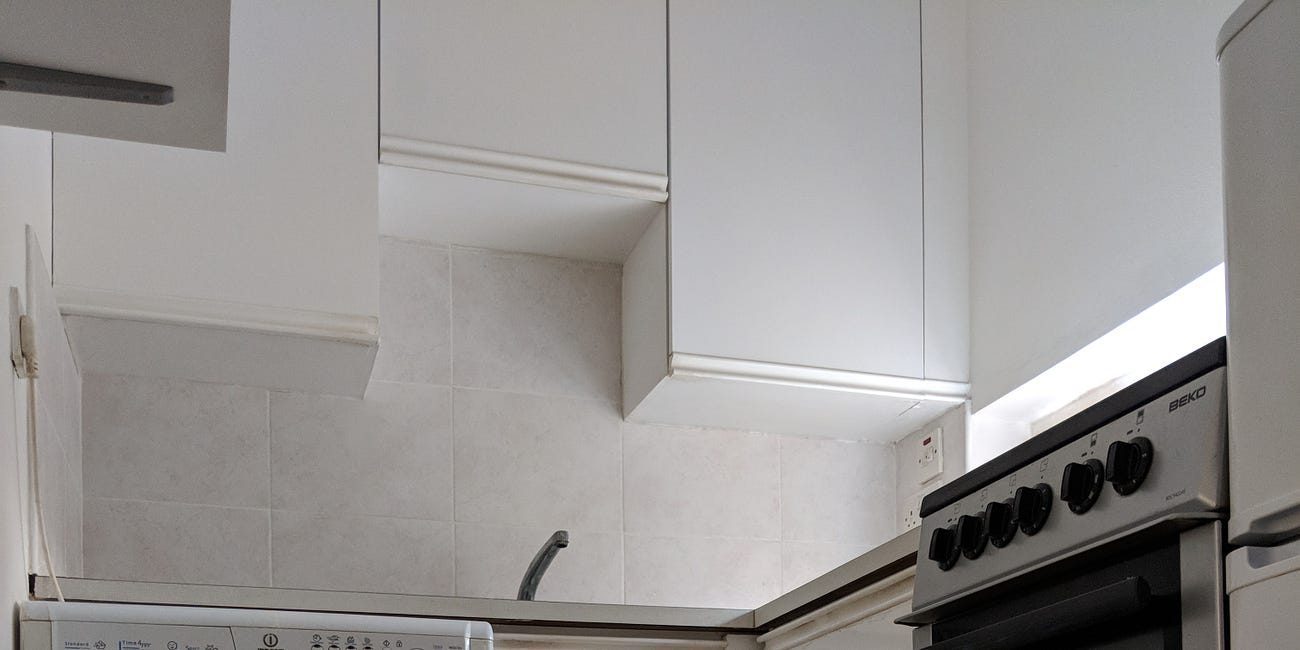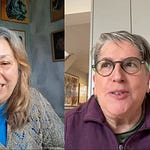Here is the transcript from the Substack Live conversation with
. Please note that the text has been edited and shortened to make it easier to read.Vanilla Black’s mantra: feed your mind, not your belly
Andrew Dargue, along with his partner Donna Conroy, opened the award-winning, Michelin recommended vegetarian restaurant Vanilla Black in York in 2004 and relocated to London in 2008. Post covid Andrew and Donna relocated to southern Spain and are currently renovating an old Spanish property.
PB (Paola Bassanese): My newsletter is called Life in Ireland.
I'm an Italian expat in Ireland and I met Vanilla Black a few years ago in London when I had a lovely meal at the restaurant and I still remember the pickled roasted potatoes, chef's kiss!
VB (Vanilla Black): (00:00:42):
Oh, we love it when people remind us about dishes, because we forget so many, so when you remind us, it's fantastic.
They were the heritage potatoes, and we cooked them, and then sat them in a pickle that was slightly sweet, and then we reheated them so that the pickle kind of evaporated, but there was a bit of a stickiness to them as well.
Well remembered.
History of Vanilla Black, award-winning vegetarian restaurant in York and London
PB: (00:01:41):
Share with us about the history of Vanilla Black and how you set it up.
VB: (00:02:13):
Basically, I always wanted my own business. Donna didn't eat much meat.
When we used to go to restaurants (I was a chef) and Donna used to say, “I’ll have the vegetarian option”, she used to always say, “why is it rubbish?” and I used to say, “because chefs don't like vegetarians”.
And many of them still don't.
And Donna one day said to me, it's always Donna's fault. “Why don't you do something about this?”
I was like, “vegetarian? I'm not getting involved in vegetarian food.”
I ate meat and I was cooking with meat. I thought about it for a while. I then decided to do something a bit different. So I set up a little business.
And then as time went on, we used to go to vegetarian restaurants and go, “wow,
they're a bit poor, aren't they?”
And then Donna had another good idea and said, “why don't we open a restaurant?” So we did.
But we set out to be like nobody else.
We just want to be completely different and just prove that vegetarian food could be interesting it didn't have just to be a plate of salad or a plate of curry, and nothing wrong with those things, but we just wanted to elevate it and make it a bit more exciting and make it a bit more of a challenge and just take it into the mainstream, really, rather than it be just for vegetarian people.
I haven't told this story, but my dad came along one day and he said, just before we opened in York, “I'd love to come to the restaurant.”
And I said, “well, you can if you want, Dad”.
You know, because York is further away from our hometown.
He said, “I'd like to come along but I'm not vegetarian.”
And I went, “but dad, you eat cornflakes?”
“Yeah.”
“Well, they're vegetarian. You eat beans on toast. You eat tomato soup. That's vegetarian.”
He said, “you don't know what I mean? All that, all that quinoa and all that, I don't want all that type of thing.”
I said, “we won't be doing that.”
“Yeah, but all that mung beans and all that, I don't want all that type of thing.”
I said, “we won't be doing that.”
But that mentality stuck with a lot of people, even to the end, it still did.
People that knew us really well knew that we weren't that hippie style of person and we didn't eat that style of food.
And they expected that in the restaurant, even though when we told them, that's not what we were going to do.
I had an old boss, Big Kev, and I've known him since I was 16. I first started with him.
Big Kev had worked in Michelin-star restaurants, et cetera.
And he came to London and he had a meal [at Vanilla Black].
I always remember we did this little marzipan sponge type dessert.
And afterwards he said, “It's not what I expected.”
I said, “you expected a vegetarian restaurant”.
He went, “yeah.”
“You've known us for donkey's years.”
He said, “yeah, I still had that stereotype in my mind.”
And it was a double-edged sword in some ways because even to the end, some people went, “wow, this is amazing” and you still get the traditionalists who go, “ooh, ooh, brie ice cream.”
(00:05:33):
We always said we were there to feed your mind, not your belly.
But this whole mentality, even when we moved to London, when we used to say to property agents, “we're opening a vegetarian restaurant,” and they would say, “we've got somewhere for you, Camden High Street.”
No, we don't want to be on Camden High Street. It wouldn't work there.
“But it's vegetarian.”
PB: (00:06:49):
I'm actually fascinated by the move from York to London.
VB: (00:07:09):
This is actually this week's Substack.
I'm not going to say we outgrew it.
When we first started, we were never about money.
It was about proving the point. Unfortunately, finance always comes in with business. You can't escape that. And it got to the stage where we were working so many hours, the restaurant didn't financially give us enough money to step back. And we were going to do something else around the Yorkshire area, but we decided not. And then somebody said again, why don't we move to London?
Bearing in mind... I made it sound very simple, which it wasn't at the time. No, it's never straightforward.
I think I had only ever been once or twice in London in my life and we were sort of going, “well, actually, yeah, why not?”
We don't have children. We weren't tied to the area. And we said, that's a challenge and it could be interesting.
And it could get us lots of debt. Let's do it!
We needed a bigger premises.
And York is quite a small place.
So to find a special property was quite difficult.
And we were just turning away so many people, which was annoying.
You know, figures weren't adding up. We were working 70-hour weeks.
Something had to change.
Within York if you're in the city walls renting rates are very expensive; we could actually get a London property for a similar price.
Moving from the UK to Spain
PB: (00:09:05):
So we're jumping quite a few years now.
I'm fascinated by your story about moving from the UK to Spain.
VB: (00:09:26):
We moved to Dorset to a little another property that we bought to renovate. And we didn't want to open another restaurant; we'd done some consultancy, we'd done some cookery classes and we said “what next?”
And after running restaurants for 18 years you can't just come off that, it's like coming off heroin, you can't just stop, you need something to do. Unfortunately a close friend passed away and that made us think about life etc. And I'd always wanted to move abroad.
We finished renovating the property, we renovate properties.
And we always know we get to the last day of renovating, everything's done.
And then we get itchy feet.
And we know we need to do something.
It's like, what's next?
And we sat there and said, well, what are we waiting for?
Because how many people do we know in life who say, I'm going to do that one day?
When I left college, my job at college, and I remember some of the college lecturers saying then,
“I'm going to open a restaurant one day.”
They never did.
And how many people in life say, “I'm going to do that one day?”
So we said, right, we'll do it.
And we did. And here we are.
PB: (00:11:14): my next question will be about Spanish bureaucracy. Can you
tell me a bit more about your experience getting your residence card and accessing services?
VB: (00:11:29):
Initially, it's not like the old days where pre-Brexit, you could get a job in a bar, move to Spain,
that's it. Now, you are a foreigner. It's like someone coming to England from Australia
They have to apply. So we did. You have to prove you have enough money to support yourself.
You have to have medical insurance.
You have to have a police check.
You have to do a medical report.
Basically, the Spanish government do not want you to use their resources. They want you to look after yourself.
I think it seemed quite daunting at the time, the amount of work that we had to complete.
Then we had to go to the embassy and we had to hand in paperwork, et cetera.
And it was all quite stern. It was intimidating in a way.
PB: (00:12:20):
Was it a bit tricky to communicate?
VB: (00:12:25):
No, because we used an agent to organise the paperwork. They would just give us a list of what they needed, translate it, and point us in the right direction.
They would even arrange the interview, the time at the embassy for us.
(00:12:47):
It was afterwards, when we came here, that you feel it different.
Once you land in Spain, you have to go and register with the local town hall, because the local towns or villages, they claim funding from central government. And that funding depends on how many people are in that town or village.
Some people don't register, which is bad.
But if you do, it means they get the correct amount of funding.
So you register.
We have two [Spanish] lessons a week where we're learning, you get by, everybody has a phone now, so you can translate and you can say what you need.
So that side, it was, it was easy really.
There's this stigma that the Spanish bureaucracy is pretty bad. I mean, our local town hall are so straightforward.
It's lovely that you have that point of contact.
We needed lots of paperwork when we renewed our visa, and they couldn't have been more helpful.
Because after your first year in Spain, you then have to reapply for year two and three.
So you expect that everything's going to take ages.
It doesn't really.
You know, if you've moved house in the UK and had to deal with changing your electricity supplier or your gas supplier or even your council tax, how long does it take to get a reply there?
No, I find it quite straightforward. People are very helpful as well.
Like I said about our town hall we can't praise them enough they're fantastic people you see them now we go driving through the village, everyone knows each other everyone knows each other by name, the mayor waves at you as you walk past you know? It's a nice community, we made them a cake we have some lemon orange trees in the garden so we made them as a thank you as a thank you and took it in. They were over the moon with this cake, you know.
It also goes a long way that we do try with our Spanish.
We're far from perfect, but we do try.
So when we do go in there, we do attempt to ask for things in Spanish.
PB: (00:16:29):
And so my next question for you is about this Spanish property that you're renovating.
VB: (00:16:50):
Finding it took longer than buying it, I think, didn't it?
Yeah.
We looked for months. We're from in Stockton and every house is just about the same or one might have a big garage, but here you can walk around, they call it ‘Puebla Blanco’, white villages, they're not even villages, they call them villages but every single house is different.
They were built by someone 200 years ago.
And over those years, they put another level on for their daughter or son and then they added an extension on for the grandparents.
It took ages to find. But the buying process… Way easier than England, much easier.
We bought through an agent that was really helpful.
They helped us a lot, even on the day when we put the deposit down, the solicitor said to us, “so which day would you like to complete?”
We were like, “we choose the completion day?” “Yes, you choose.
And that was it.
And everyone aimed for that date and we signed on exactly that date.
Once you make an offer, you put the deposit down [10%]. And that's it, you can't back out, or you lose your deposit.
Even the solicitor changed all the utilities for us. That was part of the process, it wasn't just because we were English or whatever, it's part of what the Spanish do.
The solicitor takes care of those.
We were pleasantly surprised.
PB: (00:34:16):
And now my next question is about the future.
Sugar Lips restaurant. So you're moving into fiction.
Is that a direction you want to pursue more in the future?
VB: (00:34:42):
That idea started out during lockdown, we discussed the fact that there's never been, in our humble opinion, a decent restaurant comedy on UK TV.
We even spoke to a few agents about it, and then it fell by the wayside because of Spain.
So we wanted to write a story and create characters based around a vegan restaurant which serves lab-grown meat.
Because if you think about it, one of the situations with a vegan diet is animal cruelty and the Earth's resources.
Lab-grown meat can't really be cruel because nothing's been killed.
You're not using the Earth's resources as much, you know, nowhere near.
So we want to write a story based around that and based around characters, et cetera, as well.
As you know, we did do a couple of books some years ago, which is hard work.
I remember that when we were approached in a couple of books, we didn't ask to do it.
An agent approached us.
I remember sitting in the office, and we said, how long will it take to do?
And the agent said, about a year.
PB: (00:47:12):
We have a question from Mark.
How have you found that being in a new country has influenced your cooking beyond the range/quality of ingredients?
VB: (00:47:20):
Very good question, Mark.
Because we like nothing better than looking around a food market, going to the supermarket, finding something new. We've come across so many fruits and vegetables.
Like, the chumbos: they grow on cactuses.
PB: (00:47:46):
Is it like fichi d’India in Italy? [prickly pear]
VB: (00:48:02):
But apparently if you pick them off the cactus, the spines, the spikes fly out. So even in the vegetable shop, they have them on display and they have tweezers there for you to put them into your basket to buy.
What's the fruit we've got grown here that we've never seen?
Nispero.
We make some jam with that.
Red peppers, red and green peppers.
Never used to eat them in the UK.
Never bought them.
Here, love them.
I tend to focus more on the vegetables because they taste a lot.
So, you know, I'll put some red peppers in the oven.
I'll put some pink salt on some of the olive oil from down the road.
And you're just going, wow, they're beautiful.
Drink more orange juice.
We have oranges in the back garden. We hate to see things go to waste, so we've got to drink.
Well, so the amount of lemon curd we've made is something we never do in the UK.
Everyone we get lemon curd for.
Here, the price fluctuates. You see the seasons more here.
The chumbos appear, then they disappear.
Whereas in the UK, you'll see things all year round but you don't here.
Related article:
Selling a flat in the UK to buy a house in Ireland with cost breakdown
Back in 2018 there was a lot of uncertainty in the UK, especially for European citizens like myself living in the country, who did not know how their status was going to be, for example if they would need to apply for some sort of visa to stay.
[Please note: the interview then continues but because of space limitations the edited transcript ends here]
“Bonus” feature: at (00:53:46) my dog interrupts the live because he wants to play fetch!
Join me for my next live video in the app and don’t forget to subscribe!










Share this post